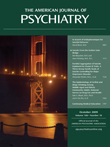To the Editor: In their recent editorial on anabolic-androgenic steroid dependency, published in the June 2009 issue of the
Journal, Gen Kanayama, M.D., Ph.D., et al.
(1) highlighted a number of areas for consideration and closer examination. The two most widely accepted standards for defining, classifying, and diagnosing drug abuse and dependence are DSM-IV and ICD-10. In DSM-IV, anabolic-androgenic steroid dependency is found in the “other substance-related disorder” section and can be coded, depending on which diagnostic criteria are met. ICD-10 codes steroids and hormones in a section on “abuse of nondependence producing substances.” ICD-10 goes on to state that “although it is usually clear that the patient has a strong motivation to take the substance, there is no development of dependence or withdrawal symptoms as in the case of the psychoactive substances.”
This difference in approach for coding anabolic-androgenic steroids prompts debate as to whether or not anabolic-androgenic steroids are dependence producing substances. In 1994, the DSM-IV Sourcebook
(2) evidence review stated that “despite increasing clinical descriptive data on anabolic steroid withdrawal, dependence, and abuse, there are insufficient substantial basic or clinical research data to support the inclusion of these syndromes in DSM-IV” (p. 140).
Anabolic-androgenic steroids are a class of medicines that have been poorly studied. Since DSM-IV, research has demonstrated anabolic-androgenic steroid properties that have been previously denied. Anabolic steroids positively affect muscle mass and strength, and there is a clear dose-response effect of androgen administration and increasing muscle mass and strength
(3) . Further, cessation of anabolic steroid administration leads to a loss of muscle mass and strength
(4) . Anabolic steroid-induced hypogonadism is an important consideration in the complete understanding of anabolic-androgenic steroids
(5) . The signs and symptoms of hypogonadism are identical to many of those described for the adapted anabolic-androgenic steroid dependency criteria. As such, anabolic steroid-induced hypogonadism is a possible confounding variable in the diagnosis of anabolic-androgenic steroid dependency. These properties must be taken into consideration regarding an anabolic-androgenic steroid dependency syndrome.
There is little question that steroids are misused by an increasing number of individuals for a variety of anticipated effects, including, most prominently, an enhancement of physique and athletic performance. Future consideration of anabolic-androgenic steroid dependency criteria must take into account anabolic-androgenic steroid properties. The development of treatments to restore hypothalamic pituitary testicular axis function will clearly prove to be both insightful and productive in the understanding of anabolic steroid-induced hypogonadism and anabolic-androgenic steroid dependency. Individuals who do not suffer from anabolic steroid-induced hypogonadism might represent a class of anabolic steroid users that fulfills the criteria for dependency.

